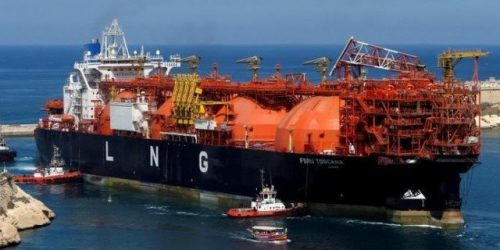Liquefied natural gas (LNG) may be the only solution to the gas crisis in winter. However, it has not worked due to the monopoly of government companies on LNG import, marketing and distribution.
Deregulation of any business sparks competition, better service delivery and a boom in relevant sectors. Owing to the monopoly of state-owned firms, competition is absent in Pakistan’s gas sector.
The previous Pakistan Muslim League-Nawaz (PML-N) government managed to import LNG for the first time in country’s history. But it has not grown in terms of increasing the number of consumers.
There are bulk consumers of LNG but it has never been the favourite choice for them. Rather, the consumers like power plants have abandoned the consumption of imported gas and provinces are not ready to consume this fuel as supply agreements have been signed at higher prices by the PML-N government.
With the passage of time, the government has faced increased financial risk with its outstanding receivables reaching Rs78 billion following diversion of LNG to domestic consumers.
The financial risk is going to mount as the government has projected an addition of Rs69 billion to the outstanding dues in the upcoming winter season.
The government has worked out different options for the recovery of dues. It can opt for a weighted average cost of gas by including the price of expensive LNG in the domestically produced natural gas price.
The federal government has discussed this proposal with provinces but they have not given their consent. Under Article 158 of the constitution, provinces have the first right to consume gas produced in their jurisdiction. Three provinces Khyber-Pakhtunkhwa, Sindh and Balochistan, except for Punjab, produce gas, therefore, they are not interested in LNG consumption.
However, the Centre argues that domestic gas reserves are depleting fast and they need to switch over to LNG to tackle shortage. At present, Punjab is the sole user of LNG. Sindh is also going to consume LNG due to a widening shortfall.
In another option, the government is planning to slap a surcharge on gas consumers to recover the price differential – the difference between prices of local and imported gas – to make LNG consumption feasible in the domestic sector.
The federal government needs support of provincial governments to follow this model. However, there are high chances that provinces will not agree to this plan.
In such a situation, the federal government’s financial risk will remain perched at high levels. This will force the government to pull out of this business and give the private sector a lead role, which will not only trigger competition but these players will also bear all the financial risks.
LNG imports by
private sector
The private sector has been pleading the government since long to dismantle the bureaucratic and procedural hurdles standing in the way of LNG import.
Experts term it a criminal offence that government authorities are hampering LNG import by the private sector, which can bring down the tolling fee. LNG terminals have the capacity for additional imports and the private sector is ready to import LNG.
At the same time, consumers have continued to pay millions of dollars for the idle capacity of terminals, which has not been utilised.
Experts blame state-owned energy companies for the scenario as they want complete control over LNG import and distribution, and resist the entry of private sector players by creating procedural hurdles.
Now, the Pakistan Tehreek-e-Insaf (PTI) government has taken a bold step by permitting the private sector to use the unutilised and excess capacity of existing LNG terminals in a bid to overcome gas shortfall in winter, push down prices and stimulate domestic and foreign investment.
The move will provide relief for the ordinary consumers and business community alike, which have been facing problems for years.
Owing to the opening up of LNG market, several investors have come forward, showing interest in setting up LNG terminals at their own risk without involvement of any government guarantee.
Pakistan GasPort, Energas of the UK and Tabeer, a wholly owned affiliate of Mitsubishi Corporation, are interested in establishing two new LNG terminals in Pakistan to help bridge the gas shortfall.
Global energy players like Qatargas, ExxonMobil, Shell, Mitsubishi, Trafigura, Total Pakistan and Vitol are major suppliers of gas.
Global suppliers and new investors eager to set up LNG terminals are looking at compressed natural gas (CNG) filling stations for the supply of LNG.
CNG sector is a “cash customer” with no risk of adding to the circular debt. At present, the gas sector is facing a circular debt of Rs250 billion.
Universal Gas Distribution Company (UGDC) Chief Executive Officer Ghayas Paracha said the company, with its complete legal framework for gas import and supply to consumers, was looking forward to starting operation by providing gas to almost 700 CNG stations and other consumers.
He revealed that Bangladesh copied Pakistan’s model in 2016 and now the system was working well there but it was delayed in Pakistan due to some reasons. Now, UGDC is hoping to bring first LNG cargo soon.
The opening up of LNG market is expected to help step up business activities and revive sectors like CNG, which does not have an alternative fuel and is ready to import and distribute gas to customers at its own financial risk.
Other sectors like fertiliser and power are also keen to import LNG. It will spark competition, push down prices and reduce the government’s financial risk.





